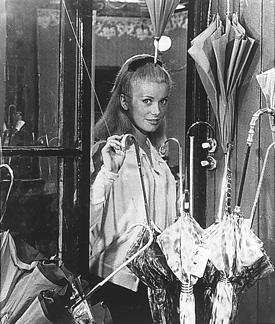
Catherine Deneuve stars in
"The Umbrellas of Cherbourg"
The Horseman on the Roof
at the Seven Gables Theatre
directed by Jean-Paul Rappeneau
(in French with English subtitles)
The gushy press guide to The Horseman on the Roof describes Jean Giono's 1953 novel about an Italian freedom fighter fleeing through nineteenth-century France during the oppressive rule of the Austrian Empire as a "literary masterpiece...a lush story of chivalry and love." I confess I've not read it, but based on this adaptation, I would not be surprised to find a reprint at the grocery store check-out alongside other disposable romantic sagas.
Dead Man
at the Harvard Exit
written and directed by Jim Jarmusch
In this darkly comic western, Johnny Depp plays William Blake, a prim Cleveland accountant and American Everyman looking for opportunity in the West of the 1870s. In the film's Fellini-esque opening sequence, Robby Muller's exquisite black and white photography dislocates and suspends us in the interior stillness of a time machine. As Blake nods in and out, and the train's passengers become increasingly primitive, the western landscapes of our dreams roll past.
Lone Star
opens June 19, Seven Gables Theatre
written and directed by John Sayles
John Sayles has been writing, editing, directing, and even, at times, acting in his films since 1979. This independent spirit has in no way prevented him from painting richly intelligent canvases of personal relationships framed within socio-political issues. And while Sayles claims to be interested in people over the cinematic arts, the crisp, economic execution of his scripts works well to strengthen the vibrancy of his characters.
[Home]
[This Issue's Directory]
[WFP Index]
[WFP Back Issues]
[E-Mail WFP]





Contents on this page were published in the July/August, 1996 edition of the Washington Free
Press.
WFP, 1463 E. Republican #178, Seattle, WA -USA, 98112. -- WAfreepress@gmail.com
Copyright © 1996 WFP Collective, Inc.
